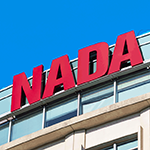NADA Issues Dealer Guidance on Counterfeit Air Bags
WASHINGTON (Oct. 10, 2012) -- The National Highway Traffic Safety Administration (NHTSA) announced today a consumer advisory on counterfeit air bags.
Federal investigators have determined that thousands of counterfeit bags have been bought and installed in U.S. motor vehicles over the past three years.
NHTSA also has determined that in the event of a frontal collision, these counterfeit bags are unlikely to deploy properly or may deploy in a manner that can harm vehicle occupants. See below for an NADA dealer Q&A document.
Vehicles with counterfeit air bags installed are believed to constitute less than 0.1% of the total in-use fleet. Nonetheless, dealers should be prepared to respond to inquiries from the public on this matter.
NHTSA is urging concerned owners to start by visiting www.safercar.gov/Air+Bags to determine if they are at risk.
In addition to the NADA guidance, dealers should expect to receive communications directly from the auto manufacturers they represent, addressing how to detect and manage counterfeit air bags.
It's important to note that unlike a safety recall campaign, customers should expect to pay to have their air bags diagnosed, and if necessary, replaced.
Questions on this matter may be directed to NADA Regulatory Affairs at regulatoryaffairs@nada.org or 703.821.7040.
NADA Guidance for Responding to Counterfeit Air Bag Questions
What is the problem with counterfeit air bags?
Upwards of thousands of counterfeit air bags may have been installed in U.S. vehicles in the last three years. These primarily are driver's side front modules. This number involves less than .1% of the vehicle fleet. But, in the event of a collision, counterfeit bags may not perform as expected. In some instances they will fail to deploy, in other instances their deployment may harm vehicle occupants.Which vehicles now on the road have counterfeit air bags installed in them?
This is not an easy question to answer. There exists no single VIN-based list of vehicles that have had air bags replaced, let alone one indicating if genuine replacement parts were used. Attached below is a National Highway Traffic Safety Administration (NHTSA) list of vehicles of greatest concern. Counterfeit bags typically appear very much like genuine OEM parts and rarely trigger a trouble light or diagnostic code and are hard to detect without a full physical inspection. Again, only air bags that have been replaced in the last three years are of concern. Consider the following: 1. Single owner vehicles where no air bag has ever been replaced are not a concern. Vehicle air bags replaced with genuine OEM replacement parts at a franchised dealership service department or body shop also are not a concern. 2. Single owner vehicles where an air bag was replaced at an independent repair facility could have a counterfeit air bag. The repair facility, insurance company (if one was involved), vehicle OEM, and/or air bag supplier may be able to help determine if an installed part is a genuine OEM replacement. Vehicle owners also may know whether a genuine OEM replacement part was not used, whether a replacement bag was bought from an internet sales or on-line auction company, or whether they paid "below market" price, indicators that a bag could be counterfeit. 3. The air bag replacement history of vehicles purchased used can be hard to determine. A commercial vehicle history report may indicate if a vehicle was involved in a crash involving an air bag deployment, however such reports cannot be fully relied upon and typically do not show if a non-crash air bag replacement has occurred. It is also possible for installed air bags to exhibit certain outward physical signs suggesting that the module may be counterfeit. For further information on such indicators, see NHTSA's Guidance on Managing Counterfeit Bags. 4. Vehicles with salvage, rebuild or reconstructed histories are suspect and should be closely examined for signs of a counterfeit air bag.How should I respond to inquiries regarding potential counterfeit bag installations?
Direct them to NHTSA's consumer website www.safercar.gov/Air+Bags to obtain the primary point-of-contact for the vehicle make and model. This likely will be a phone number for the appropriate OEM call center. They should have their VIN readily available along with as much information as possible regarding known or suspected air bag replacements. OEM call centers will help to determine whether genuine OEM replacement part(s) were used. If uncertain, they likely will suggest that a physical inspection of the suspected counterfeit air bag(s) be performed at a dealership service or body department.What if a vehicle comes in for an air bag inspection?
Service advisors should be instructed to inform customers of the diagnostic charges involved. Carefully follow any OEM instructions on how to determine if an air bag is counterfeit. These instructions will involve an outward inspection, possible diagnosis of the passive occupant restraint system, and/or the removal and inspection of the module in question. If a counterfeit air bag is discovered, inform the customer of the cost to replace it with a genuine part and how long it will take to obtain and install it.What if a customer refuses to have his vehicle restored with a genuine OEM part?
Instruct the customer that you cannot put the counterfeit part back into the vehicle or give them the part. Have them sign an acknowledgement indicating that they are refusing to pay to have the vehicle restored and that they recognize that the vehicle will not offer them the same protection as if it were restored. Do not attempt to hide the fact that the vehicle is missing an operational air bag (e.g., putting on a false cover and turning off the trouble light).How can I help protect myself against liability for working on vehicles with counterfeit bags?
Contact your dealership attorney to draft a document designed to serve as a notice, hold harmless, and indemnification in the advent of a subsequent problem involving a vehicle where a counterfeit air bag is removed and the customer refuses to pay to have it restored. Note too that dealerships are under no legal obligation to conduct either the diagnostic or repair work described above.Are there any special precautions technicians should take when handling counterfeit air bags?
In addition to the normal precautions that should be followed when handling air bags, NHTSA strongly advises technicians not to electrically probe counterfeit air bag connecting terminals because of the risk of detonation and possible serious injury. NHTSA and the OEMs are expected to provide specific guidance on air bag handling and disposal procedures. In addition, NHTSA may request that they be notified if and when a counterfeit air bag is discovered.What steps, if any, should be taken with respect to the purchasing and reselling of used vehicles?
Federal law does not regulate the purchase or resale of used vehicles that may have had counterfeit replacement air bags previously installed. For advice on whether and to what extent obligations exist under state law, please consult your dealership attorney.How can we help stop the use of counterfeit, stolen, salvaged, or rebuilt air bags?
Always urge your customers to demand genuine replacement parts for vehicle service and repair, especially where safety is involved.Media Contacts

Jared Allen

